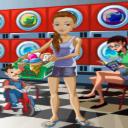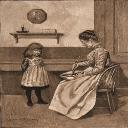Yahoo Answers is shutting down on May 4th, 2021 (Eastern Time) and beginning April 20th, 2021 (Eastern Time) the Yahoo Answers website will be in read-only mode. There will be no changes to other Yahoo properties or services, or your Yahoo account. You can find more information about the Yahoo Answers shutdown and how to download your data on this help page.
Trending News
Ideas please? Flowering plants lesson for 15 students.?
I am teaching a lesson on flowering plants to my home school group tomorrow. I would like to demonstrate the life cycle simply with out worksheets (if possible). I am planning on using baby powder and fake flowers to show how bugs and wind can pollinate the flowers. We don't have many flowers in bloom here yet although some are starting to. The lesson has to last about 30 minutes.
Ages are from 6 to 10. My son liked the baby powder idea. Of course we will talk about bees specifically but are not the only bugs that pollinate. I need to so as much as possible for free as we are broke right now.
Also I'm allergic to a lot of pollins so the less in the class room the better for me.
5 Answers
- anonLv 41 decade agoFavorite Answer
Here are a few links to lesson plans:
http://www.discoveryeducation.com/teachers/free-le...
http://www.discoveryeducation.com/teachers/free-le...
http://www.smithsonianeducation.org/educators/less...
This one is my favorite because it includes using talcum powder as pollen, but is scientifically accurate. You could add a real plant dissection demonstration if you can't get a flower for everyone. Show the students the parts of the flower.
http://pollinatorlive.pwnet.org/teacher/lessons.ph...
Since you have a fairly large age range, you may have to change things up a bit. I like some of these lessons because they teach the correct terminology and scientific facts, rather than simply being fun. They can be both. I disagree that the baby powder activity is juvenile, but I don't think that it should be all there is to the lesson. Use the cornstarch type, as it will not aggravate asthma as much if anyone has it. If you have allergies, then take an antihistamine proactively, before you start the lesson. I like the idea to visit flower shops before you do the lesson.
- ?Lv 61 decade ago
How old are these students? I really think this baby powder idea is very, very juvenile and best suited for preschoolers. In fact, I wouldn't use it for any age. It is like a baking soda volcano, no accurate science involved.
Hands on is best. If you have no access to flowers in your yards, at least purchase some. Even the grocery store has spring flowers now. Get a few daffodils, or lilies. Dissect them to show the parts. You could have a nice worksheet showing the parts (enchantedlearning.com has good ones), but show them the real parts of a flower and how they pollinate.
Make sure to specify what kind of "bugs" pollinate.
Get a short video from the library, or books with pop-ups or overlays that illustrate it.
Source(s): I have been home schooling for 17 years, several years ran a 1st and 2nd grade home school science group that met weekly. Learned real things are the best! - HistoryMomLv 51 decade ago
Wow some of the answers you got are ummmm interesting.
You don't need ACTUAL flowers to show how they grow and you don't have to use worksheets either (some people tend to forget that ages 6-10 learn better by seeing/doing than by reading about things, not all kids but most).
The baby powder is good as it can be used to show 'pollen' that is very fine & cornstarch can show 'pollen' that is more easily seen (maybe give it a little 'tint' to show the difference).
Discuss how animals & people alike play a role as pollinators (sorry but bees aren't the only ones who do pollenation).
Have them do a craft to help get it across ( turn a clothespin into a bee with some pipecleaners &colored paper for wings & use small pom-poms on the legs to indicate the pollen that they pick up & carry).
Send the kids on a 'hunt' for plants they think might be pollinated by certain animals (ie bee's, cats, dogs, birds, humans, etc) ** remind them to look but not touch**
Give the kids each a dixie cup (you know those small ones that sit on someone's sink) and fill it with potting soil and then plant a seed that they need to watch & care for & then report back on how long it took for the seed to start sprouting ( if you have a Dollar Tree near you, you can get all the stuff I mentioned without breaking a bank account...total maybe 10 bucks).
I have homeschooled for 7 yrs and when my daughter was that age, that is how it got it across to her (we also took a trip to our local science center & saw the 'beehive' center they had in action). Now each yr we plant different things and keep track of the length of time from seedling to sprout & sprout to plant as well as the animals that are near them (butterflies,bees,etc). When I taught Pre-K I used all different ways (from balloons to egg cartons & everything in between). Check out www.FamilyFun.com and see what they have for craft ideas.
Good luck & I hope you all have fun 'growing' in knowledge.
Source(s): 7th yr homeschool mom 13 yrs Pre-school/Pre-K/After school Teacher www.FamilyFun.com - momo8Lv 51 decade ago
If you need flowers, go to a flower shop and ask if they would give you some flowers that are too old to sell, that they would throw out. The local flower shop here gives people flowers if they are using them for school.
- How do you think about the answers? You can sign in to vote the answer.




